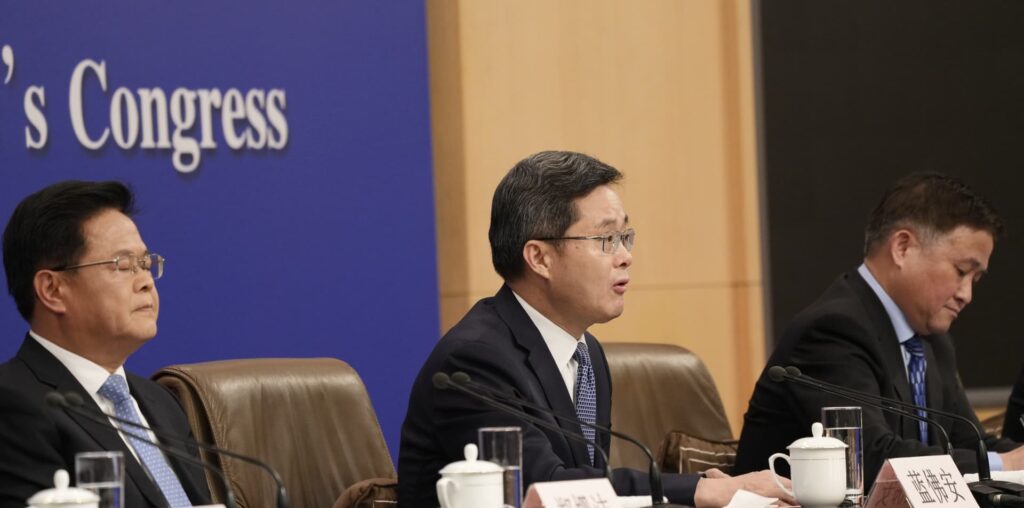Lan Fo’an, China’s finance minister, center, speaks as Zheng Shanjie, chairman of the National Development and Reform Commission (NDRC), left, and Pan Gongsheng, governor of the People’s Bank of China (PBOC), listen during a news conference on the sidelines of the National People’s Congress in Beijing, China, on Wednesday, March 6, 2024.
Bloomberg | Bloomberg | Getty Images
BEIJING — China’s Minister of Finance Lan Fo’an told reporters Saturday during a highly anticipated press briefing that the central government has room to increase debt and the deficit.
He emphasized that the space for a deficit increase is “rather large,” but noted such policies are still under discussion, according to CNBC’s translation of the Chinese.
Economists have insisted that China needs additional fiscal support, but Beijing has yet to announce any. In the days leading up to the briefing, many investors and analysts had hoped that China was gearing up to unveil a major new stimulus package.
Lan signaled that the weekend briefing was not the end, that more stimulus is on the way and that the debt or deficit changes markets have been waiting for could come in the near future. It remains unclear whether the size of any such stimulus would meet market expectations, or how much would go directly towards consumption or real estate.
The finance ministry on Saturday also outlined policy measures focused on addressing local government debt problems, stabilizing real estate and supporting employment.
On real estate, the finance ministry will allow local governments to use special bonds for land purchases and allow affordable housing subsidies to be used for existing housing inventory, instead of only new construction, Vice Minister of Finance Liao Min said at the same press conference, according to CNBC’s translation of the Chinese.
He added that authorities were considering plans to reduce real estate-related taxes. He did not name specific figures and noted supporting real estate required multiple policies.
“These policies are in the right direction,” Zhiwei Zhang, president and chief economist at Pinpoint Asset Management, said in a note Saturday. He added that more details are needed to evaluate the impact of such policies on the macro outlook, and “this will be the focus of the market in [the] coming months.”
In a meeting in late September, led by Chinese President Xi Jinping, authorities had called for strengthening monetary and fiscal policy support. But they did not lay out the details.
Analyst projections for how much fiscal stimulus is needed range from around 2 trillion yuan ($283.1 billion) to more than 10 trillion yuan.
Ting Lu, chief China economist at Nomura, had cautioned in a note Thursday that any such stimulus would typically need approval by China’s parliament, expected to hold a meeting later this month. He added that how any funds are used is just as important as the amount that’s delivered — whether they only go to shoring up struggling local government finances or focus on boosting consumption.
China’s retail sales grew only modestly over the last few months, and the country’s real estate slump has shown few signs of turning around.
GDP rose by 5% in the first half of the year, sparking concerns that China could miss its full-year target of around 5%. All eyes are now on Oct. 18, when the National Bureau of Statistics is scheduled to release third-quarter GDP.
Bruce Pang, chief economist and head of research for Greater China at JLL, said he is watching for more details to be announced at a parliamentary meeting later this month. He added “it would be reasonable and practical” to keep some dry powder in the event of unexpected shocks.

After markets reopened Tuesday following a weeklong holiday, mainland Chinese stocks became volatile throughout the week, as a stimulus-fueled rally lost stream. The declines took major indexes back to levels seen in late September.
Stocks had climbed then — the CSI 300 saw its best week since 2008 — as major policy announcements signaled that the Chinese government was finally stepping in to stimulate slowing growth.
Just days after the Federal Reserve began its easing cycle, the People’s Bank of China cut a few of its interest rates and extended existing real estate support measures by two years. The PBOC also launched a roughly $71 billion program allowing institutional investors to borrow funds for stock investing.
The National Development and Reform Commission, the top economic planning agency, pledged in a rare press conference Tuesday to speed up use of 200 billion yuan originally allocated for next year, mostly for investment projects. The NDRC did not announce additional stimulus.
Saturday is a working day in China, but markets are closed.

